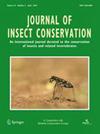Initial assessment to understand the effect of air temperature on bees as floral visitors in urban orchards
IF 1.9
3区 农林科学
Q2 ENTOMOLOGY
引用次数: 1
Abstract
Abstract Bees are the most important pollinators and, like many other insects, are facing a global decline that threatens crop pollination services. Both honey bees and some wild bee species are used commercially for pollination, including pollination in blueberry and cherry orchards. In our study, we assessed bee visits to experimental blueberry and cherry orchards immersed in an urban landscape to understand how air-temperature affects the potential contribution of honey bees and wild bees to pollination services. The potential contribution to pollination services was estimated using the Pollination Importance Value index, where the pollen collected by the floral visitor is a determining variable. In our study, bumble bees and honey bees were the most important floral visitors in the orchards, followed by the wild bee Anthophora plumipes . We found that honey bees were affected by changes in air-temperature and their decrease in the potential contribution to pollination services was offset by the niche complementarity provided by bumble bees. Implications for insect conservation Even small changes in air-temperature can alter bee communities by affecting bee species susceptible to low temperatures. Our work is a first assessment of how climate change may affect the complementarity of pollinator communities in orchards. We suggest that strategies to mitigate local air-temperature changes in urban areas, focusing primarily on these species, could potentially have cascading effects that would support the overall pollination services provided by bee communities.气温对城市果园访花蜜蜂影响的初步评估
蜜蜂是最重要的传粉者,像许多其他昆虫一样,正面临着威胁作物授粉服务的全球衰退。蜜蜂和一些野生蜜蜂都被商业上用于授粉,包括在蓝莓和樱桃园授粉。在我们的研究中,我们评估了蜜蜂在城市景观中对实验蓝莓和樱桃园的访问,以了解气温如何影响蜜蜂和野生蜜蜂对授粉服务的潜在贡献。利用授粉重要值指数(授粉重要值指数)估算对传粉服务的潜在贡献,其中访花者收集的花粉是一个决定变量。在我们的研究中,大黄蜂和蜜蜂是果园中最重要的访花者,其次是野生蜜蜂Anthophora plumipes。我们发现蜜蜂受到气温变化的影响,它们对传粉服务潜在贡献的减少被大黄蜂提供的生态位互补所抵消。对昆虫保护的启示即使是很小的气温变化也可以通过影响对低温敏感的蜜蜂物种来改变蜜蜂群落。我们的工作是对气候变化如何影响果园传粉者群落互补性的首次评估。我们建议缓解城市地区局部气温变化的策略,主要关注这些物种,可能会产生级联效应,从而支持蜜蜂群落提供的整体授粉服务。
本文章由计算机程序翻译,如有差异,请以英文原文为准。
求助全文
约1分钟内获得全文
求助全文
来源期刊
CiteScore
3.60
自引率
10.50%
发文量
76
审稿时长
6 months
期刊介绍:
The Journal of Insect Conservation is an international journal devoted to the publication of articles concerned with the conservation of insects and related invertebrates. The Journal of Insect Conservation publishes papers on all aspects of conservation and biodiversity related to the insects and closely related groups such as Arachnids and Myriapods, including ecological work which has conservation implications. Research papers may address the subject at the community, population or species level, may cover aspects of behaviour, taxonomy or genetics, be theoretical or practical, and be local or global in nature. Review articles are welcome as well as points of view which are likely to stimulate debate. From time to time the journal will publish Special Issues on specific subject areas which are the focus of current research. Proposals for such issues are welcome.

 求助内容:
求助内容: 应助结果提醒方式:
应助结果提醒方式:


